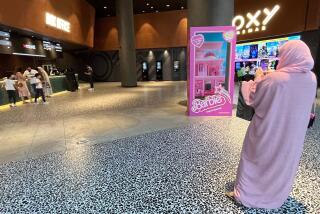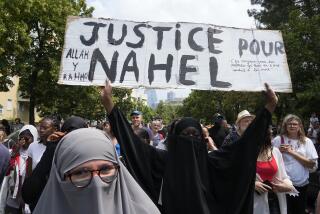Culture : Algeria’s Berbers Battle a New ‘Enemy’ in Centuries-Old Fight : The original North Africans have always stood up to conquerors. Now two parties with those roots have emerged in the continuing fight for democracy and minority recognition.
TIZI OUZOU, Algeria — The day after Islamic fundamentalists won an unexpected majority in nationwide municipal elections, barkeepers all over Algiers started stowing their liquor bottles under the counter, just in case. At the ornate Palace of the People overlooking the capital city, the pulsing festival music at the annual International Fair was suddenly silenced five times a day for prayers.
But it was different here in Algeria’s mountainous Kabylia region, home to most of the country’s 4.5 million Berbers, where religion is most happily taken in small doses.
Even after election day last month, the prized Algerian wine nurtured in the vineyards on the Kabylia flatlands flowed freely over lunch tables. The voice of Ait Menguellet, the Berbers’ answer to Bob Dylan, wailed over coffee shops in Tizi Ouzou, the capital of Berber country, all day long. At Tizi Ouzou University, home to Algeria’s first Berber studies institute, women were more likely to be wearing Levis than veils.
The Kabyles proudly recalled the day during the election campaign when bearded Islamic fundamentalists stormed into a Berber bar and demanded a halt to alcohol sales. The prohibitionist crusaders quickly sailed out of the bar at the receiving end of dozens of Berber fists.
“Either we win, and they leave the country, or we all die,” said one aging businessman, Sidhoum Amokrane, who had begun mourning the election results with a bottle of Cabernet Sauvignon the evening before. The next day at noon, he was again contemplating them over lunch and another bottle.
“If you scratch my skin,” he said matter-of-factly, “you will find written underneath it, ‘Kabyle.’ We are the real North Africans.”
Berbers, as the indigenous tribes of North Africa are called, make up only about one-fifth of Algerians. In a country that has for years outlawed their language, arrested their leaders and banned their poets, they have ironically emerged as the political focal point for the upcoming fight to prevent Islamic fundamentalists from seizing national power.
In the wake of the ruling National Liberation Front’s stunning loss to the fundamentalists, political analysts say two parties with Berber roots--the Rally for Culture and Democracy (RCD) and the Socialist Forces Front (FFS), the first legalized political associations for Berbers since independence in 1962--now represent the most viable vehicles for organizing Algeria’s democratic mainstream into an assault against the fundamentalists.
“They have not managed to divide Kabylia. We are still the real enemies of the power,” said Hocine Ait Ahmed, a Berber hero of the revolution whose FFS organization had been banned since 1963 until the political reforms of last year.
Said by some to be the descendants of the biblical giant Goliath, Berbers, whose recorded history in the region goes back more than 3,000 years, have spelled trouble for every army or faction that has come to North Africa over the centuries--from the Greeks and the Romans to the Phoenicians, Arabs, Turks and finally the French. Berbers came down from the hills alternately to greet them, and, when they settled in as new oppressors, to take up arms against them.
Originally spread across North Africa from the Nile to the Atlantic, the Berbers, who are a Caucasian people related to the inhabitants of southern Europe, have become so integrated over time with various conquerors of the region that nearly everyone in North Africa has Berber blood. The Arabs have had the strongest influence, and in Algeria, most people define themselves either as Arab or Berber--a distinction said to be mostly one of choice.
But the Berbers of Kabylia, along with others such as the Chaouia to the southeast along the Tunisian border and the Bedouin Tuaregs who roam the Sahara, have been particularly jealous of their culture and resistant to invaders.
Urban Berbers, many of whom are blond or red-haired and either blue- or green-eyed compared to their darker-complexioned Arab countrymen, live more Westernized lives in patterns learned from the French. They are Muslim, but not militantly so. Women are never veiled, preferring the bright, multicolored dresses and head scarves unique to the Berbers.
The Arabs sometimes accuse the Berbers of being Communists. While most are not, it is true that a large proportion of the newly legalized Communist Party is made up of Berbers.
Many Kabyles today see both Algeria’s ruling FLN and the Islamic fundamentalists as modern-day oppressors in the Berbers’ decades-old fight to have their culture officially recognized and their language, Tamazir, adopted as one of Algeria’s official tongues.
Teaching of the Berber language had been banned in Algeria since 1970, after a Kabyle officer staged an unsuccessful uprising against former President Houari Boumedienne, and speaking Berber on the streets was forbidden. Even now, books on Kabyle culture cannot be found in Algeria.
But a new cultural--and political--consciousness has begun taking root in Kabylia. Here in their homeland, Berbers don’t even like to be called Berbers anymore. They believe the appellation comes from the word barbarian and prefer to be known, in their own Tamazir language, as Amazirin. In Tizi Ouzou, they have established the first Tamazir language program and have launched a cultural studies department that by next year could for the first time begin granting college degrees in Amazir studies.
Although it was the riots of October, 1988, in downtown Algiers that touched off the frenetic pace of political reform in Algeria, many Berbers and some political analysts say the roots of the movement for reform really go back to 1980, a time that has come to be known as the “Berber Spring.” Violent riots erupted throughout the Kabylia region at the time when police arrested Berber poet Maoloud Mammeri as he tried to deliver a lecture at Tizi Ouzou University.
“One had to be cautious, even with one’s own family,” Malika Ahmed Zayed, an economics professor who heads an umbrella group of Berber cultural organizations, recalls of that time.
Even the classic love songs a young Ait Menguellet had been singing began taking on a new meaning that spring.
“Try to understand me,” he declared in one. “All that I have been talking about is not for the one I love, it is not for the one I love that my arms are bruised, it is for another reason.” His beloved, it turned out, was Kabylia--and Kabylia’s Djurdjura Mountains prepared to spawn a national resistance movement. The Berber Cultural Movement, whose genesis predated the revolution, was born again out of the 1980 uprising; so were nearly 300 other cultural associations.
Said Zayed: “My son, who went to school when he was 5, was told: ‘You must not speak Kabyle at school. You have to speak Arabic at school.’ This happened last year, in 1989. The day when a child will come home and will not understand what his parents are saying--this day means that Berber culture is dead.”
Independence from the French, she said, turned out to be only the beginning. “The first thing was to be independent. We had to be Algerians before anything. We had to be free from the yoke of colonialism. . . . I remember one of the songs I used to hear over and over when I was a child was, ‘You, grasshoppers, crickets, get out of my country!’ My parents used to sing this song. And these few words meant everything.”
Combatting the ruling FLN was the next important step toward winning official recognition of Berber culture--and democracy for all Algerians, many Kabyles believe. “The Berber Spring was the starting point of all the fights, of the main fights that led to democracy,” Zayed said.
The same Berber movement spawned Algeria’s first human rights organization in 1985. The legalization of the country’s first political parties since independence brought both the RCD, an outgrowth of the Berber Cultural Movement, and the FFS, which emerged from underground.
Ait Ahmed’s FFS, complaining that last month’s elections were a sham that gave fledgling political parties no real opportunity to battle the ruling FLN, staged a boycott of the election that some political analysts say could have been partly responsible for the fundamentalists’ victory.
Turnout nationwide in Algeria’s first free elections since independence was only 65%. In Tizi Ouzou province, only 20% voted. Not a single person voted in two Kabyle municipalities.
On the other hand, the FFS was able to mobilize an astonishing 100,000 people in a May 31 “democracy” march in Algiers, despite a total news blackout by the state media. In addition to Berber cultural themes, the FFS rally launched a broad-based, secular appeal aimed at a broad spectrum of Westernized Algerians and feminists who are not ready to take on fundamentalist veils or robes.
“Don’t Touch My Sister”--an FFS takeoff on a famous French anti-racist slogan, “Don’t Touch My Buddy”--was seen on placards all over downtown. The RCD--dubbed by the fundamentalists “Rassemblement Contre Dieu” (Assembly Against God)--netted less than 6% of the local government seats, but blamed the poor showing on the FFS boycott.
The unexpected response to the FFS march, along with the decided defeat of the FLN, prompted many political analysts to conclude that it will be the Berber parties, attempting to broaden their constituencies beyond the Berber population, that will be in the strongest position to combat the fundamentalists in upcoming National Assembly elections.
“We forced the Berber problem to be part of the democratic debate,” said Said Sadi, head of the RCD. “It took us 20 years to take it out of Kabylia. . . . But if democracy is springing out, the Berber culture will be out of danger and can be developed. Of course, if we go into fascism, the Berber culture will die.”
Salem Djebara, an assistant professor at Tizi Ouzou University who is also active in the Berber cultural movement, said Berber politicians “will have to forget their disagreements, which are childish ones, and we will all look to the future together and see what can be done. You still need to hope. I hope. Whether Algeria will be a fundamentalist country or not? It’s in our hands.”
Background on Berbers
* Berbers are the indigenous tribes of North Africa, originally spread from the Nile to the Atlantic. Pockets of Berber tribes exist today in Algeria, Tunisia, Libya and Morocco.
* The recorded history of the Berbers goes back more than 3,000 years. They are said to be the descendants of the biblical giant Goliath.
* 4.5 million Berbers live in Algeria, most in the mountainous Kabylia region. THey represent only about one-fith of Algerians.
* Teaching of Tamazir, the Berber language in the Kabylia region, has been banned in Algeria since 1970.
* Most Algerians define themselves either as Arab or Berber--a distinction said to be mostly one of choice. Berbers are Muslim.
* Urban Berbers live very Westernized lifestyles. In the villages, Kabyles live along very close-knit, tribal lines, with strong village councils and families dominated by men.
More to Read
Sign up for Essential California
The most important California stories and recommendations in your inbox every morning.
You may occasionally receive promotional content from the Los Angeles Times.










